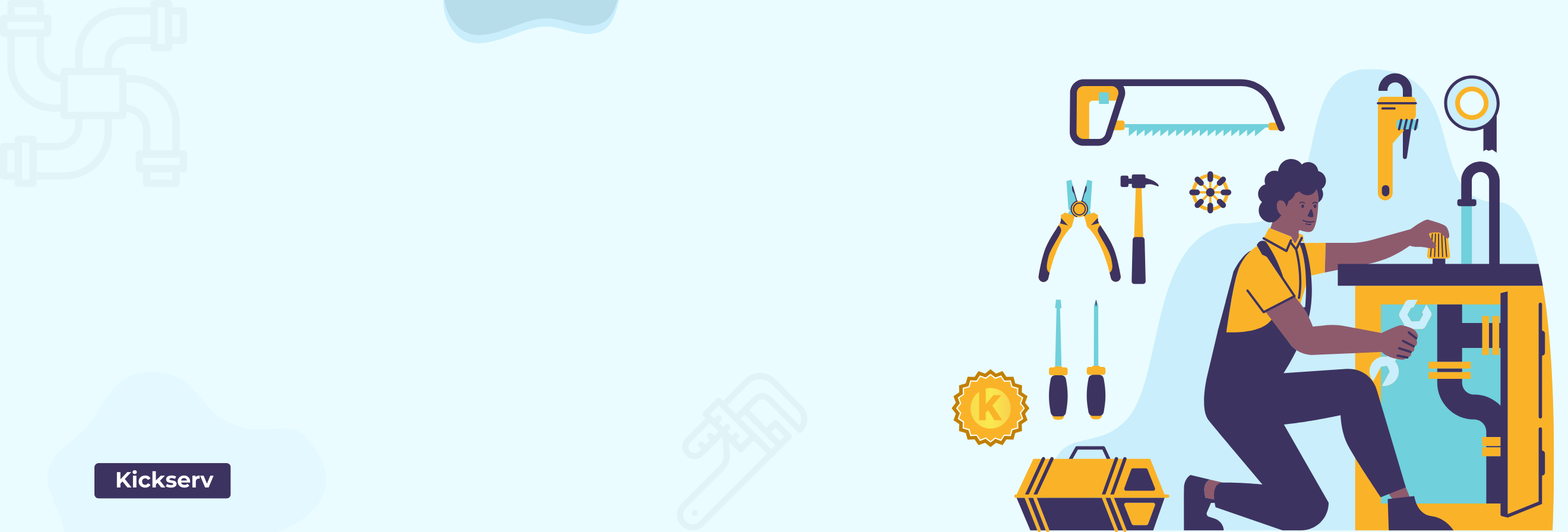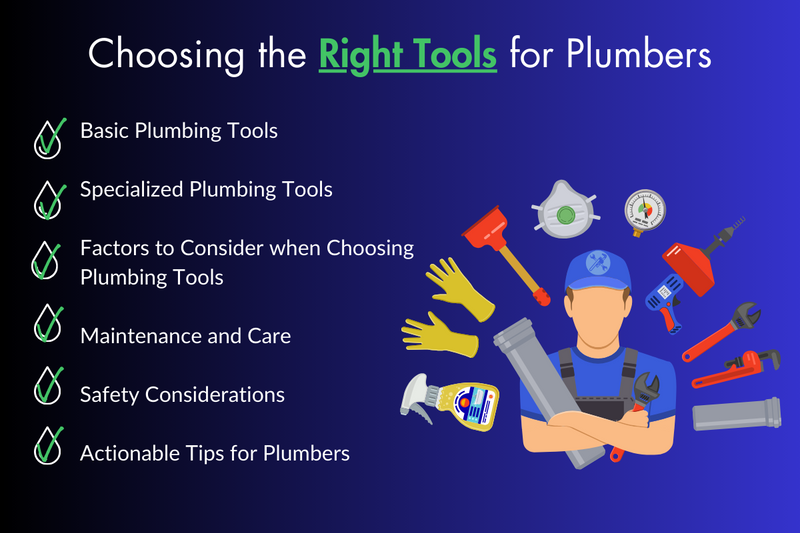
Choosing the Right Plumbing Tools: A Comprehensive Guide
Choosing the Right Plumbing Tools: A Comprehensive Guide
Introduction
For commercial plumbers and home plumbing services alike, issues are sure to crop up. Having the right tools on hand can make all the difference between a quick fix and a major disaster. Selecting the right plumbing tools is key for fast and skillful repairs. In this guide, we explore the best plumbing tools. We also explain their use and give tips on choosing the right ones for your needs.
I. Basic Plumbing Tools:
Pipe Wrench:
- The pipe wrench is considered one of the best plumbing tools. It is designed to grip and turn pipes, fittings, and other round objects.
- Look for an adjustable pipe wrench that can handle various pipe sizes.
Plunger:
- A plunger is a simple yet effective plumber tool for clearing clogs in drains and toilets.
- Choose a heavy-duty plunger with a strong suction cup for better results.
Pipe Cutter:
- For cutting pipes with precision, a pipe cutter is an indispensable tool.
- Consider a tubing cutter for copper pipes and a hacksaw for PVC pipes.
Adjustable Wrench:
- An adjustable wrench is versatile and useful for various nuts and bolts.
- Look for a wrench with a comfortable grip and a wide jaw opening.
Teflon Tape:
- Teflon tape is essential for creating leak-proof seals on threaded pipe connections.
- Ensure you have high-quality Teflon tape for durable and effective sealing.
II. Specialized Plumbing Tools:
Plumbing Snake (Auger):
- A plumbing snake clears stubborn clogs deep within pipes.
- Choose an auger with a flexible cable and a sturdy handle for ease of use.
Pipe Threader:
- Professionals often use a pipe threader to create a secure connection.
- Think of the size and material of the pipes you will be working with before selecting a threader.
Tubing Bender:
- With copper pipes, a tubing bender is key to creating precise bends without kinking.
- Look for a bender with various angle options to accommodate different pipe configurations.
Propane Torch:
- For soldering copper pipes, a propane torch is a necessary plumber tool.
- Ensure the torch has a reliable ignition system and adjustable flame control.
Flaring Tool:
- A flaring tool creates flared ends on copper pipes for secure connections.
- Choose a tool with a sturdy construction and many flare size options.

III. Factors to Consider when Choosing Plumbing Tools:
Quality:
- Invest in high-quality plumbing tools that are durable and built to last.
- Check for reputable brands and read reviews to ensure reliability.
Material Compatibility:
- Consider the types of pipes you will be working with (copper, PVC, PEX) when selecting tools.
- Some tools are made for specific materials, so choose accordingly.
Size and Weight:
- Ensure the plumbing tools are of a manageable size and weight. This is important if you will be using them for extended periods.
- Ergonomically designed tools with comfortable grips can reduce fatigue.
Versatility:
- Look for plumber tools that serve many functions to streamline your toolkit.
- Versatile plumbing tools can save space and make your plumbing tasks more efficient.
Cost:
- While quality is crucial, consider your budget when purchasing plumbing tools.
- Compare prices but focus on the value and durability of the tools.
IV. Maintenance and Care:
Cleaning:
- Clean your plumbing tools after each use to prevent the buildup of dirt and debris.
- For cutting tools, use a wire brush to remove any residue.
Storage:
- Proper storage is essential to prevent rust and damage.
- Invest in a sturdy toolbox or tool chest to keep your plumbing tools organized and protected.
Sharpening:
- Keep cutting tools sharp for precise and efficient cuts.
- Use a sharpening stone or file to maintain the sharpness of the blades.
V. Safety Considerations:
Personal Protective Equipment (PPE):
- Wear gloves and safety goggles to protect against splashes, cuts, or irritants.
Heat-Related Precautions:
- When using heat, exercise caution to prevent burns or fire hazards.
Shutdown Procedures:
- Be sure to turn off water sources to prevent accidents and keep a safe working environment.
Electrical Awareness:
- Water and electricity can be a dangerous combination. Take necessary steps to avoid electrical hazards.
Seek Professional Advice:
- When in doubt, seek professional advice or help. Focus on safety for risk-free plumbing projects.
VI. Actionable Tips for Plumbers:
Invest in Quality Tools:
- Focus on durability and reliability by investing in high-quality tools from reputable brands. The best plumbing tools cost more, but they pay off in the long run-in cost per use.
Consider Material Compatibility:
- Tailor your toolkit to the types of pipes you often work with (copper, PVC, PEX). Ensure that your tools are compatible with the materials you encounter.
Focus on Safety:
- Always wear appropriate personal protective equipment (PPE). Use caution with heat-producing tools and be aware of potential electrical hazards. Safety should be at the forefront of every plumbing task.
Maintain and Clean Tools:
- Extend the life of your best plumbing tools by cleaning them after each use. For cutting tools, use a wire brush to remove residue. Keep blades sharp with regular sharpening.
Organize Your Toolkit:
- Invest in a sturdy toolbox or tool chest to keep your plumbing tools organized. A well-organized toolkit improves efficiency and protects your tools from damage.
Versatility Matters:
- Choose versatile tools that serve many functions. This streamlines your plumbing tools list and makes you more adaptable to different plumbing tasks.
Know When to Seek Professional Help:
- Recognize your limitations. If something is beyond your expertise, do not hesitate to seek professional help. It is better to seek help than risk making a situation worse.
Stay Informed and Updated:
- Plumbing technology and techniques evolve. Stay informed about the latest advancements in plumbing. Update your knowledge and skills through workshops, training, and industry publications.
Conclusion:
Picking the correct plumbing tools is key for successful plumbing projects. To make a strong tool kit, it is important to understand each tool's function. You should also think about material compatibility and size. It is also important to invest in the best quality tools you can afford upfront, if possible. Taking care of your plumbing tools also helps them last longer. Whether you are a seasoned pro or new in the field, the best plumbing tools help to ensure a job is well done.
Need help with running the day-to-day of your plumbing business so you can focus on your plumbing tools? Kickserv makes it easy to provide the best plumbing services to your customers. Get started with a 2-week free trial today.

How to Efficiently Schedule Technicians: 7 Tips
Discover 7 proven tips on how to efficiently schedule technicians, maximizing productivity and customer satisfaction. Learn expert strategies for streamlining your operations today.

17 Best tips for home service marketers to grow their business
Discover these 17 effective tips to boost your home service provider marketing efforts and attract more customers.
Never miss a post.
Get notified of new content